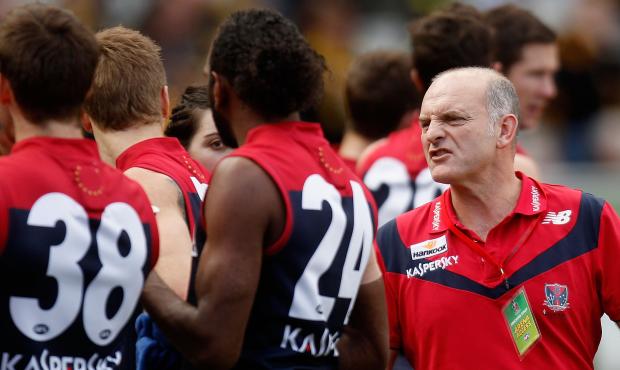In round 14, 2011, the Demons took on Richmond in what was billed as a battle of the best emerging teams in the competition.
Melbourne, under the guidance of Dean Bailey, went into the game in ninth place on the ladder, with a 5-6-1 record. The previous weekend the Demons had thrashed Fremantle at the MCG by 89 points.
The Damien Hardwick-led Tigers were 10th, having won five of their 12 games.
In an article published in The Age on the morning of the match – headlined 'Fight for the 2014 flag?' – former Demons skipper Garry Lyon wrote: "… the important question that needs to be debated is which of these two promising, on the rise outfits is closest to genuinely challenging for that elusive premiership."
Lyon concluded his article by stating: "The good news is that both clubs have once again become relevant in the competition, and while it may be a long shot, another Saturday meeting between these two teams on a sunny afternoon at the MCG on the final weekend of the 2014 season would be a dream come true for their long-suffering, but faithful supporters."
Such was the anticipation in the lead-up to the clash that 61,900 people turned up at the MCG on a sunny Saturday afternoon in late June to watch it. It was the second highest crowd for a Melbourne v Richmond home and away game in VFL/AFL history.
The Tigers started well, recording the first seven inside-50s and opening a 16-point lead. But Melbourne then took the game by the throat, and it was a Brad Green bomb into the Demons' forward line, which was marked in bullocking style by Jack Watts, that ignited their charge.
After Watts kicked truly, Bailey's men slammed on another five unanswered goals. By quarter-time, Melbourne led 7.1 to 3.5.
Having been 26 points up at the first change, the Demons held sway during the remainder of the contest, their game-plan revolving around fast ball-movement through the corridor.
Criticised in the preceding weeks for playing bruise-free football, they also laid 91 tackles, with Ricky Petterd registering 14 tackles of his own.
When the final siren sounded, the boys in red and blue had won 17.16 (118) to 13.13 (91), and the margin would have been even greater had the Dees not booted 2.10 in the third quarter.
The victory ensured Melbourne ended the round in eighth place on the ladder.
Watts finished with three goals and 19 possessions (11 contested) and was later awarded one vote in the Brownlow Medal for his effort. Three votes went to midfielder Brent Moloney, who gathered 30 possessions, laid nine tackles and won 11 clearances. Defender James Frawley received two.
Emerging onballer Jack Trengove was another star for the winners, kicking three goals and laying nine tackles, while Tom Scully collected 26 touches. Liam Jurrah also dazzled the big crowd, finishing with 19 disposals and two goals from six scoring shots.
When it was all said and done, Melbourne had won the title as the best emerging team in the league.

"Today was really important because of the build-up with both clubs having a lot of young players, with both clubs developing players," Bailey said at his post-match press conference.
"But I thought a bloke like Brad Green was good for us again today. His last couple of weeks have been outstanding. Jared Rivers down back was great, Brent Moloney was terrific and Nathan Jones was one of our leaders as well who just gives his all every week.
"Although the game was built up around a lot of the young players I thought our senior guys were very good."
Added Hardwick: "I just thought Melbourne's pressure around the ball was very, very good. The heat they brought was outstanding and we just couldn't quite cope."
But, as we now know, the result was a mirage. The Demons suffered a 10-goal loss to the Western Bulldogs the following weekend, which saw them fall to ninth place on the ladder. They have not been in the top eight since.
Four weeks after the great win over Richmond, Melbourne played Geelong at Simonds Stadium and lost by 186 points. Bailey was sacked and the rebuild he had overseen since being appointed coach in late 2007 was terminated.
Now his successor, Mark Neeld, has also come and gone and the club is preparing to rebuild the rebuild of its rebuild.
In contrast, Richmond has powered on. The Tigers may have missed the finals in 2011 and again last season but they have continued on a gradual upward trend during Hardwick's reign. And they have now beaten Melbourne in four consecutive matches.
Today Richmond sits in sixth place on the ladder and seems a very good chance to play in the finals for the first time since 2001.
How times have changed since that fateful June day almost two years ago.
RICHMOND v MELBOURNE
Round 14
June 25, 2011
MATCH DETAILS
Richmond 3.5 7.5 10.9 13.13 (91)
Melbourne 7.1 12.4 14.14 17.16 (118)
GOALS
Richmond: Vickery 3, Farmer 2, Newman 2, Deledio, Edwards, Foley, Grigg, Riewoldt, Martin
Melbourne: Watts 3, Green 3, Trengove 3, Jones 2, Martin 2, Jurrah 2, Howe, Sylvia
BEST
Richmond: Foley, Deledio, Newman, Nahas, Edwards, Houli, Vickery
Melbourne: Moloney, Watts, Jones, Frawley, Scully, Green, Petterd, Jamar
INJURIES
Richmond: Conca (head knock)
Melbourne: Macdonald (knee)
SUBSTITUTES
Richmond: Reece Conca (head knock) replaced by Jeromey Webberley in the third quarter
Melbourne: Joel Macdonald (knee) replaced by Cale Morton in the third quarter
REPORTS
Richmond: Nil
Melbourne: Nil
Umpires: Margetts, Stevic, Findlay
Official crowd: 61,900 at the MCG


